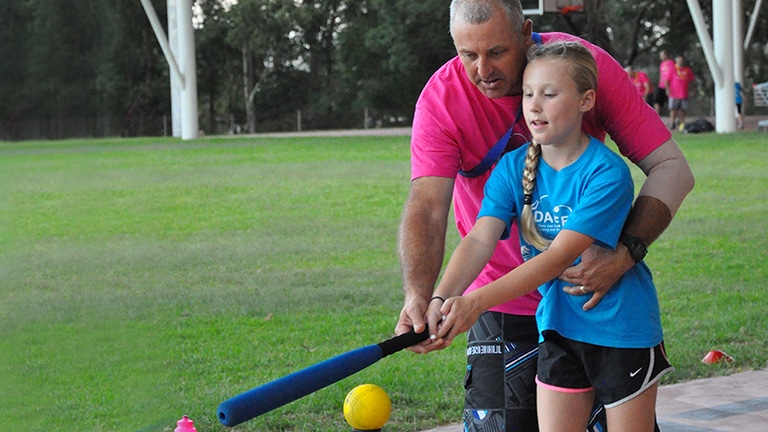
The NSW Government will invest $2.4 million in a State-wide rollout of the DADEE girls empowerment program.

The NSW Government will invest $2.4 million in a State-wide rollout of the University of Newcastle’s award-winning empowerment program Dads And Daughters Exercising and Empowered (DADEE).
By helping fathers to improve their daughters’ physical activity levels, sport skills and social-emotional wellbeing, DADEE is a key component of a four-year, multifaceted strategy called Her Sport Her Way.
In announcing the initiative, NSW Minister for Sport Stuart Ayers hopes the strategy will drive powerful change for women and girls in sport, expanding participation levels and leaving a legacy for future coaching and promotion.
“In recent years, women’s sport has experienced enormous success on and off the field with record crowds and television audiences,” Minister Ayes said. “But there is still significant work to be done to increase participation, improve facilities and attract investment.”
Currently, only 21 per cent of NSW girls younger than 14 participate in organised sport and physical activity outside of school, at least three times a week. Participation rates plateau at adolescence while boys’ rates are higher and continue to rise.
The four-year funding for DADEE will enable NSW Sports and Recreation staff to be trained to deliver the program, while sports-specific variants are developed for major sporting organisations.
DADEE was conceived by physical activity researcher Professor Philip Morgan and colleagues, with the Hunter Medical Research Institute’s support, as the first program to teach fathers to be agents of change for daughters. It originated from a Hunter Children’s Research Foundation pilot grant in 2013 and received further backing from Port Waratah Coal Services (PWCS).
Research findings show that DADEE has successfully improved girls’ self-esteem, resilience, sport skills and physical activity levels as well as spurring greater interest in playing sport.
“The outcomes have been outstanding for both fathers and daughters,” Professor Morgan said. “After participating, the girls feel better about themselves, have stronger relationships with their fathers and are more active within the family. We also saw dramatic improvements in sport skills and participation and a newfound confidence in their physical abilities.”
In 2019 the program will be replicated in England to help low-income families in London get active with their children, via a $A1 million grant from Sport England with UK organisations Women in Sport, the Fatherhood Institute, Fulham Football Club and the English Football League Trust.
The research team comprises Professor Philip Morgan, Professor David Lubans, Dr Myles Young, Dr Narelle Eather, Emma Pollock, Dr Alyce Barnes, and Kristen Saunders from the Priority Research Centre in Physical Activity and Nutrition at the UON. HMRI partners with the University of Newcastle, Hunter New England Health and the community.
HMRI would like to acknowledge the Traditional Custodians of the land on which we work and live, the Awabakal and Worimi peoples, and pay our respects to Elders past and present. We recognise and respect their cultural heritage and beliefs and their continued connection to their land.

Hunter Medical Research Institute
We’re taking healthy further.
Locked Bag 1000
New Lambton
NSW, Australia, 2305



This site is protected by reCAPTCHA and the Google Privacy Policy and Terms of Service apply.
Copyright © 2024 Hunter Medical Research Institute | ABN: 27 081 436 919
Site by Marlin Communications
